大学路小编给大家带来了呼伦贝尔雅思阅读解题技巧解析 雅思阅读动植物类真题及答案:ThePearl相关文章,一起来看一下吧。

在雅思考试中,雅思阅读题型也越来越多样化,为了考生能够高效的备考雅思阅读考试,我给大家整理了呼伦贝尔雅思阅读解题技巧解析,希望对于大家备考有一定的作用。
雅思阅读各题型解题技巧
1、判断题
在做题目之前注意要求,如:TRUR/FALSE/NOT GIVEN或YES/NO/NOT GIVEN,要按要求写到答题纸上。做题技巧:先在题目中的句子定位信号词,名词是关键的信号词,但是一定要挑选出“长相别致”的名词,如果题目中的名词在文章的“TITLE”中出现,千万不要当成信号词,因为很多段落中都会出现该名词,很难判断出题目落在哪个段落。如果能找到特别的名词很容易就可以准确地定位段落了。若在题目中真的无法找到合适的名词,可以换其他词性(雅思阅读主要考查六种词性,包含名词),下面按照其他词性列举出来考查重点,主要考点:形容词和副词是对它们的比较级、最高级和反义词进行考查;动词主要对其同义词、反义词和该动词的范围程度(如题目中用LESSEN,而原文中用ELIMINATE)设有考点;数词的考试重点在英语和*数字的互相转换(50%--FIFTY PERCENT/HALF);连词往往是在文章本身中隐含答案,最常暗示答案的几个连词是BUT,HOWEVER,WHILE,AND,ALSO,MOREOVER.雅思阅读对冠词、介词、代词、感叹词这四种词性基本不进行考查。通过词性定位好段落后,把含定位词的整个句子划线,不要只看半句话,以免与题目理解有误。然后,对题目本身做个心里翻译,再把原文和题目进行对照和比较,作出相应的判断。
2、归纳题
首先要用判断题类似的方法找相应的定位词,对所填空格采取“就近原则”,无需把给出的一段或几段话的题目全部理解或全部翻译出来。目前归纳题有两种趋势,一种是题目贯穿在整篇文章,另一种是只隐藏在其中一二个段落。另外,要注意信号词的同义词代换(原文用DEVELOP,题目里却变化为EVOLVE)。
3、段落配对题
“首尾句原则”比较适合快速而且准确地做好这个题型。官方的出题思路通常是把答案落在段落的第一句或最后一句,如果在这两句中找不到答案,最好往文章第二句或第三句找,依据上述四句话基本可以把答案找到。另外,注意选项LIST OF HEADINGS中所提供词汇与原文的同义词代换。
4、选择题
先通过题干把定位词划出来,然后对应所在的段落。对选择题必须对每个选项要有准确的理解,最主要的方法是对答案“排除法”,有些答案通过对文章的大概理解就可以排除。倘若选项当中含有ONLY,ALL, NOTHING,NEVER,EVERY等词,通常可以使用“绝对词原则”。另外,若选项当中有答案很相近的地方,可以通过“部分相同原则”(也称之为双胞胎原则),但这两个原则并不是100%适用,仅作为一个重要技巧的参考方法。对选择“TITLE”题的做法,有时不用太看懂文章,直接看答案就可以做出来,值得一提的是,一定要筛选最概括的答案,不能选择很细节的答案。
II. 阅读题干,划出定位词
上面这个例子涉及的是学术论文中实验类文章结构对于段落细节配对题的辅助解题思路。下面我们再来看一个说明文结构对于解决其他题型作用的例子:剑桥雅思真题集4 Test 1 Passage 2 “What do whales Feel?”。
雅思考试听、说、读、写四大板块,每个板块都有其难点,但是对于大多数雅思烤鸭们来说,雅思阅读更是一块难啃的“硬骨头”。思润雅思考试指导老师分析指出,雅思考试阅读部分的考试对于烤鸭们来说,常常存在三大难题:一为阅读量较大,短短一个小时的时间,需要考生完成三篇相当长度的文章阅读和四十道题目的解答,往往会使得考生在考生上因为时间的分分流逝而焦躁不安;二为难度较大的文章内容,对于单词量相对较小且语言功底相对较为薄弱的同学来说往往无法正确把握文章的意思故而导致失分;三为题型的多样和复杂性,雅思阅读开创性的设立了众多的考核题型,不同题型有不同的解题和思维方法,这也在一定程度上给考生带来了障碍。正因为这三大拦路虎,所以才造成了众多考生在阅读这一项上纷纷落马,悻悻而归。那么,对于这样具有一定难度的阅读考试,考生到底应该怎么合理安排考试,特别是考试现场的合理时间和解题顺序安排,才能最大程度的发挥考生的应有水平呢?
C、worked together well as a group in solving problems。
合理安排雅思阅读答题时间的技巧
雅思阅读答题技巧有很多,但合理安排时间无疑是其中非常重要的一个环节,为我特收集整理雅思阅读答题技巧,分享给大家,希望对大家有所帮助,文中观点仅供参考。
做好阅读的关键就是多练习。看报纸、杂志和原文小说,努力提高阅读能力,加快阅读速度.
最重要的是,阅读考试并不考你对某一篇文章读懂了多少,而是考查你的阅读技巧,就是快速阅读的能力--扫描与略读。
所谓的扫描就好像看*号码簿,你心里很清楚你要找什么,所以你快速扫描所看的那一页来找到答案。这种技巧通常用来回答多项选择题以及配对题。快速扫描文章找到问题所问的信息。
略读就是快速阅读一个段落,了解中心意思,而忽略细节。这种技巧可以用来回答:“给出一个段落的小标题 ”或是“在那个段落中提到这个信息?”或是“作者的观点”这类的题目。
雅思阅读的难度是渐进的,做题的时间安排应该是:第一篇文章大约用15-17分钟,第二篇20分钟左右,23-25分钟做第三篇。如果有多余的时间就检查一下答案。
在读文章以前先快速浏览一遍所有的问题,有个大致的概念你需要去寻找什么样的信息,需要用扫描阅读还是略读,还是两种技巧都要使用。浏览问题的时候,用铅笔划出重要的信息,例如:日期、地点和名字。
浏览完毕所有问题之后,扫读一次文章,标出重要的部分。如果看见任何与问题相关的信息,直接标出来,有些题目边看就可以边答了。
根据自己标出的重要信息一次回答问题,文章看过一遍以后,去找特定的信息就会变得更容易。
答案在文章里面出现的顺序通常与问题的顺序是一致的,例如第4题的答案通常会比第5题的答案先出现。不过这主要看问题的类型,如果问题问的是 In which paragraph does this information appear?" 以及Yes / No / Not given类型的问题,那么答案就不一定是按顺序了。
一找到问题的答案就在答题纸上作答,不一定要按顺序回答问题。
注意看题目要求,如果题目要求用不超过3个单词来作答,记住不要超过3个。
最难的是 True / False / Not given 与Yes / No / Not given 类型的题目。平时多练习做这种题型,考试的时候要记住看清楚要你回答True / False还是Yes / No,不要用True / False回答Yes/No,也不要用Yes/No回答True/False,这种回答会被视为错误而没有分数。
不要在一个题目停留太久,找不到答案就接着做下一题,有时间再回头做。
做好雅思的阅读题除了掌握对的 方法 ,也离不开我们日常的辛勤练习,下面我给大家带来雅思阅读动 植物类 真题及答案:The Pearl,一起加油吧!
雅思阅读动植物类真题:The Pearl
The Pearl
A
Throughout history, pearls have held a unique presence within the wealthy
and powerful. For instance, the pearl was the favored gem of the wealthy
during the Roman Empire. This gift from the sea had been brought back from
the orient by the Roman conquests. Roman women wore pearls to bed so
they could be reminded of their wealth immediately upon waking up. Before
jewelers learned to cut gems, the pearl was of greater value than the diamond.
In the Orient and Persia Empire, pearls were ground into powders to cure
anything from heart disease to epilepsy, with possible aphrodisiac uses as well.
Pearls were once considered an exclusive privilege for royalty. A law in 1612
drawn up by the Duke of Saxony prohibited the wearing of pearls by nobility,
professors, doctors or their wives in an effort to further distinguish royal
appearance. American Indians also used freshwater pearls from the Mississippi
River as decorations and jewelry.
B
There are essentially three types of pearls: natural, cultured and imitation. A
natural pearl (often called an Oriental pearl) forms when an irritant, such as
a piece of sand, works its way into a particular species of oyster, mussel, or
clam. As a defense mechani*, the mollusk secretes a fluid to coat the irritant.
Layer upon layer of this coating is deposited on the irritant until a lustrous
pearl is formed.
C
The only difference natural pearls and cultured pearls is that the irritant is
a surgically implanted bead or piece of shell called Mother of Pearl. Often,
these shells are ground oyster shells that are worth
significant amounts of money in their own right as
irritant-catalysts for quality pearls. The resulting
core is, much larger than in a natural pearl. Yet,
as long as there are enough layers of nacre (the
secreted fluid covering the irritant) to result in a
beautiful, gem-quality pearl, the size of the nucleus
is of no consequence to beauty or durability.
D
Pearls can come from either salt or freshwater sources. Typically, saltwater
pearls tend to be higher quality, although there are several types of freshwater
pearls that are considered high in quality as well. Freshwater pearls tend to
be very irregular in shape, with a puffed rice appearance the most prevalent.
Nevertheless, it is each individual pearls merits that determines value more
than the source of the pearl. Saltwater pearl oysters are usually cultivated in
protected lagoons or volcanic atolls. However, most freshwater cultured pearls
sold today come from China. Cultured pearls are the response of the shell to a
tissue implant. A tiny piece of mantle tissue from a donor shell is transplanted
into a recipient shell. This graft will form a pearl sac and the tissue will
precipitate calcium carbonate into this pocket. There are a number of options
for producing cultured pearls: use freshwater or seawater shells, transplant
the graft into the mantle or into the gonad, add a spherical bead or do it nonbeaded.
The majority of saltwater cultured pearls are grown with beads.
E
Regardless of the method used to acquire a pearl, the process usually takes
several years. Mussels must reach a mature age, which can take up t0 3 years,
and then be implanted or naturally receive an irritant. Once the irritant is
in place, it can take up to another 3 years for the pearl to reach its full size.
Often, the irritant may be rejected, the pearl will be terrifically misshapen, or
the oyster may simply die from disease or
countless other complications. By the end
of a 5 t0 10 year cycle, only 50% of the
oysters will have survived. And of the pearls
produced, only approximately 5% are of
substantial quality for top jewelry makers.
From the outset, a pearl fanner can figure
on spending over $100 for every oyster
that is farmed, of which many will produce
nothing or die.
F
Imitation pearls are a different story
altogether. In most cases, a glass bead is
dipped into a solution made from fish
scales. This coating is thin and may
eventually wear off. One can usually
tell an imitation by biting on it. Fake
pearls glide across your teeth, while the
layers of nacre on real pearls feel gritty.
The Island of Mallorca (in Spain) is known for its imitation pearl industry.
Quality natural pearls are very rare jewels. The actual value of a natural pearl
is determined in the same way as it would be for other “precious” gems.
The valuation factors include size, shape, color, quality of surface, orient
and luster. In general, cultured pearls are less valuable than natural pearls,
whereas imitation pearls almost have no value. One way that jewelers can
determine whether a pearl is cultured or natural is to have a gem lab perform
an x-ray of the pearl. If the x-ray reveals a nucleus, the pearl is likely a beadnucleated
saltwater pearl. If no nucleus is present, but irregular and *all dark
inner spots indicating a cavity are visible, combined with concentric rings of
organic substance, the pearl is likely a cultured freshwater. Cultured freshwater
pearls can often be confused for natural pearls which present as homogeneous
pictures which continuously darken toward the surface of the pearl. Natural
pearls will often show larger cavities where organic matter has dried out and
decomposed. Although imitation pearls look the part, they do not have the
same weight or *oothness as real pearls, and their luster will also dim greatly.
Among cultured pearls, Akoya pearls from Japan are some of the most lustrous.
A good quality necklace of 40 Akoya pearls measuring 7mm in diameter sells
for about $1,500, while a super- high quality strand sells for about $4,500. Size
on the other hand, has to do with the age of the oyster that created the pearl (the
more mature oysters produce larger pearls) and the location in which the pearl
was cultured. The South Sea waters of Australia tend to produce the larger
pearls; probably because the water along the coast line is supplied with rich
nutrients from the ocean floor. Also, the type of mussel common to the area
seems to possess a predilection for producing comparatively large pearls.
G
Historically, the world’s best pearls came from the Persian Gulf, especially
around what is now Bahrain. The pearls of the Persian Gulf were natural
created and collected by breath-hold divers. The secret to the special luster of
Gulf pearls probably derived from the unique mixture of sweet and salt water
around the island. Unfortunately, the natural pearl industry of the Persian Gulf
ended abruptly in the early 1930’s with the discovery of large deposits of
oil. Those who once dove for pearls sought prosperity in the economic boom
ushered in by the oil industry. The water pollution resulting from spilled oil
and indiscriminate over-fishing of oysters essentially ruined the once pristine
pearl producing waters of the Gulf. Today, pearl diving is practiced only as
a hobby. Still, Bahrain remains one of the foremost trading centers for high
quality pearls. In fact, cultured pearls are banned from the Bahrain pearl
market, in an effort to preserve the location’s heritage. Nowadays, the largest
stock of natural pearls probably resides in India. Ironically, much of India’s
stock of natural pearls came originally from Bahrain. Unlike Bahrain, which
has essentially lost its pearl resource, traditional pearl fishing is still practiced
on a *all scale in India.
雅思阅读真题答案解析——pearl珍珠
1 A
【原文参考依据-A】第2句话 the pearl was the favored gem of th wealthy during the Roman Empire.在罗马帝国时代,珍珠是深受富人喜爱的宝物。
2 E
【原文参考依据-E】第一句话Regardless of the method used to acquire a pearl,the process usually takes several years.不管用什么方法去获取珍珠,这个过程通常需要几年。所以对应题干中的difficulties.
3 F
4 C
【原文参考依据-c】第一句话The only difference natural pearls and cultured pearls is that the irrtant is a surfically implanted bead or piece of shell called Mother of Pearl.天然珍珠和人工养殖珍珠的唯一差别在于人工养殖珍珠的*物是一个通过外科手术植入的珠子或者小块的壳,被称作珍珠母。
5B
【原文参考依据-A】第四句话Roman women wore pearls to bed so they could be reminded of their wealth immediately upon waking up.罗马女人还戴着珍珠上床睡觉,这样她们一觉醒来看到珍珠的时候,马上就能看到自己是多么的富有。
6 J【原文参考依据-A】第6句话 In the orient and PersiaEmpire,pearls were ground into powders to cure anything from heart disease to epilepsy,with possible aphrodisiac as well.在亚洲和波斯特帝国,珍珠被磨成珍珠粉用来治疗从心脏病到癫痫的各种疾病。
7 K【原文参考依据-F】The Island of Mallorca (inSpain)is known for its imitation pearl industry.西班牙的马略卡岛以生产人造珍珠首饰而著名
8F【原文参考依据-F 】Among cultured pearls ,Akoya pearls from Japan are some of the most lustrous.产自日本的珍珠是所有人工养殖珍珠中光泽度最亮的一种。
9C【原文参考依据-F】 倒数第二句 The South Sea waters of Australia tend to produce the large pearls;probably because the water along the coast line is suppliced with rich nutrients from the ocean floor.产自澳大利亚的南海海域的珍珠个头一般更大。
10 D 【原文参考依据-G 末句】Unlike Bahrain,which has essentially lost its pearl resource ,traditional pearl fishing is still practiced on a *all in India. 在印度,小规模的传统 潜水 收集珍珠作业仍然存在。
11 TRUE【原文参考依据-C 】第三句话The resulting core is,therefore,much larger than in a natural pearl.因此,人工养殖珍珠的内核比天然珍珠要大。
12 FALSE 【原文参考依据- F第10句话】In general,cultured pearls are less valuable than natural pearls, whereas imitation pearls almost have no value.总体来说,人工养殖珍珠的价值比不过天然珍珠,而人造珍珠就更没有价值可言了。题目中说养殖的珍珠和天然的珍珠价值是一样的 显然是错误的,所以答案是False.
13 TRUE 【原文参考依据- F 倒数第2句话】 he South Sea waters of Australia tend to produce the large pearls;probably because the water along the coast line is suppliced with rich nutrients from the ocean floor.产自澳大利亚的南海海域的珍珠个头一般更大。
14 NOT GIVEN
雅思阅读技巧之词汇+ 总结
雅思阅读技巧锦囊一:英语词库
所谓英语词库是英语对英语的词库而非是英语对汉语的词库。每个烤鸭都清楚雅思是国际性考试而非中国性质考试,单词背其中文意思在考试过程中是无效的,题目和 文章 都没有中文的出现。雅思阅读就是在全文中的找答案,可是你所用定位的词很多时候不会老老实实的坐在原文里等着你,这就需要你具备英语 同义词 的能力。
比如剑桥6的67页的list of headings 的 key point 2 的首句中managers should ensure that all employees have specific goals and receive comments on how well they are doing in those goals. 与之相对应的答案是establish targets and give feedback 同意词组为:have specific goals等于establish targets,receive comments on how well they are doing in those goals等于give feedback。
雅思阅读技巧锦囊二:ability to paraphrase
Paraphrase意思是用英文的 句子 或者段落来解释其英文的句子或者段落。对于外语系的孩子来讲这种能力的考试是家常便饭,也就造就了他们的理解能力比非外语系的同学们好很多。这种能力在雅思阅读考试中也是司空见惯的。
例如:剑桥6的43页的判断题10. Cities with high level of bicycles usage can be efficient even when public transport is only averagely good. 很多孩子看见only习惯性判为NO。因为太绝对了。实则不然,答案为YES。对应于原文中two most ‘bicycle friend’ cities considered—Amsterdam and Copenhagen—were very efficient, even though their public transport systems were ‘ reasonable but special.
切记:高分的取得不只是靠技巧,阅读能力的提升非常的重要
雅思阅读必备高分三技能
技能一:拥有扎实的词汇语法基础及背景知识
这里强调的其实是英文基础的重要性。考生想要在考试过程中游刃有余,没有一定的词汇量基本是没有办法达成的。当然我们在考试中可以通过上下文,转折词等等猜测生词的意思。但是,一旦生词量超过一定比例,势必会影响考生的理解。说到理解,在雅思考试中碰到长难句是常有的事情。那么扎实的语法基础也是考生正确理解文章意义的一个重要的必备素质。
除去扎实的词汇语法基础之外,丰富的背景知识也是一名高分考生所必须的。雅思阅读考试人文社科类和自然科学类当中有众多小分支话题,涉及天文、地理、生物、地质、语言学、发展史等等众多领域。为了保证考试时的阅读效率及答题的正确性,考生需要在平时多多查阅相关资料,了解各类文章背景。
技能二:熟悉题型的做题思路和技巧和出题角度
雅思阅读考试的题型多种多样,有细节题,有主旨题,有考察整体理解的题型,也有考察辨别信息能力的题型。
因此,建议想要取得高分的学员,在掌握每种题型的解题技巧的同时,还需要研究的是考试的出题角度,仔细研究各种题型考察的是何种能力。然后有针对性的去锻炼这方面的能力。14年的雅思阅读考试中,所占比重最大的几类题型为细节 配对 题、是非无判断题、选择题。之前常考的 List of headings对在去年的考试中所占比例并不大。14年几乎每场考试都有细节配对题出现,那么其实可以反映出雅思考试更加注重考生的细节定位能力以及对于材料的理解能力。
技能三:充分到位的精读和模拟训练是必不可少的
精读是提高分数的唯一法宝。精读的方法是:
用一小时完整的做一个Test三篇文章,然后一篇文章一篇文章的开始精读。
查出每篇文章的所有生词,并要求认知。接着分析文章所有的长难句,翻译整篇文章。
把所有题的出题点在文章里标出来。我们要非常清楚对是为什么对,错是为什么错。精读可以提高同学们的词汇、长难句分析能力以及对整篇文章做题思路的理解。
模拟训练可以提高考生两方面的能力:一是考试答题顺序的安排。二是考试时间的合理分配。
首先是答题顺序的安排。考生并不用完全按照考试文章的顺序来答题。完全可以通过对于标题的浏览来确定文章大意。然后根据自己的熟悉程度来选择文章的先后顺序。
另外,在确定了文章的先后顺序之后,题目的先后顺序其实也是需要进行合理安排的。比如14年很流行的段落细节配对题,虽然经常出现在文章很靠前的位置,但是,无论什么样的位置出现,这种题型都应该放在最后来解决。除了答题顺序之外,考试时间的精确掌控也是考生是否能够取得高分的一个重要因素。雅思阅读考试是个精泛读结合过程,不是所有的文字都需要进行精读的,恰恰那些基础很好有能力有机会考到高分的考生,往往会犯全篇通读的错误,导致最后答题时间不够,没能完成所有的题目而不能取得满意的成绩。
保存并继续
另外要提醒考生注意的是,在平常的模拟考试中就养成是用答题卡的习惯,这样才不至于在考试的时候因为时间不够而出现答题卡不能填写完全的情况。相信很多次的模拟练习之后,考生一定有能力在考试时,用最合理的时间分配进行最佳顺序的答题,最终取得高分成绩。
以上就是大学路小编给大家带来的呼伦贝尔雅思阅读解题技巧解析 雅思阅读动植物类真题及答案:ThePearl,希望能对大家有所帮助。
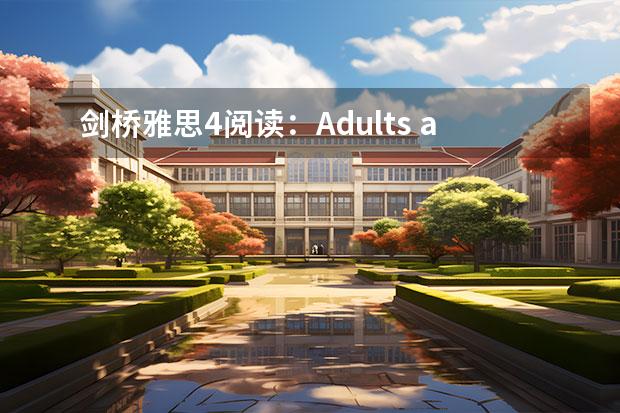 剑桥雅思4阅读:Adults and children are frequently...这篇答案 呼伦贝尔雅思阅读解题技巧解析 雅思阅读熟词多义题解析
剑桥雅思4阅读:Adults and children are frequently...这篇答案 呼伦贝尔雅思阅读解题技巧解析 雅思阅读熟词多义题解析
剑桥雅思4阅读:Adultsandchildrenarefrequently...这篇答案洛阳大华雅
2023年11月05日 12:57 请问2023年剑桥雅思阅读真题解析:Thomas Young 呼伦贝尔雅思阅读解题技巧解析 剑桥雅思4阅读:Adults and children are frequently...这篇答案
请问2023年剑桥雅思阅读真题解析:Thomas Young 呼伦贝尔雅思阅读解题技巧解析 剑桥雅思4阅读:Adults and children are frequently...这篇答案
请问2023年剑桥雅思阅读真题解析:ThomasYoung您好,我是专注留学考试规划和留学咨询的小钟
2023年11月06日 09:22 2023年4月雅思阅读考试真题答案(4月24日) 2023年4月雅思考试(4月10日)阅读真题答案 呼伦贝尔雅思阅读解题技巧解析
2023年4月雅思阅读考试真题答案(4月24日) 2023年4月雅思考试(4月10日)阅读真题答案 呼伦贝尔雅思阅读解题技巧解析
2023年4月雅思阅读考试真题答案(4月24日)您好,我是专注留学考试规划和留学咨询的小钟老师。在追
2023年11月07日 09:21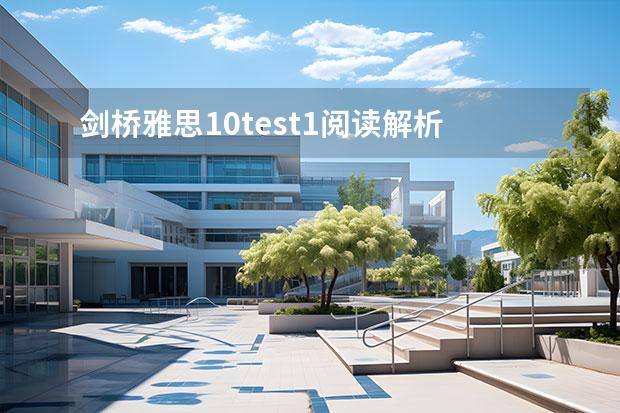 剑桥雅思10test1阅读解析 呼伦贝尔雅思阅读解题技巧解析 剑桥雅思阅读6 test3答案?
剑桥雅思10test1阅读解析 呼伦贝尔雅思阅读解题技巧解析 剑桥雅思阅读6 test3答案?
剑桥雅思10test1阅读解析您好,我是专注留学考试规划和留学咨询的小钟老师。在追寻留学梦想的路上,
2023年11月07日 11:15 求剑桥雅思9 G类答案(呼伦贝尔雅思阅读解题技巧解析)
求剑桥雅思9 G类答案(呼伦贝尔雅思阅读解题技巧解析)
求剑桥雅思9G类答案你好这位朋友,剑桥雅思CambridgeIELTS9GeneralTrainin
2023年11月07日 23:10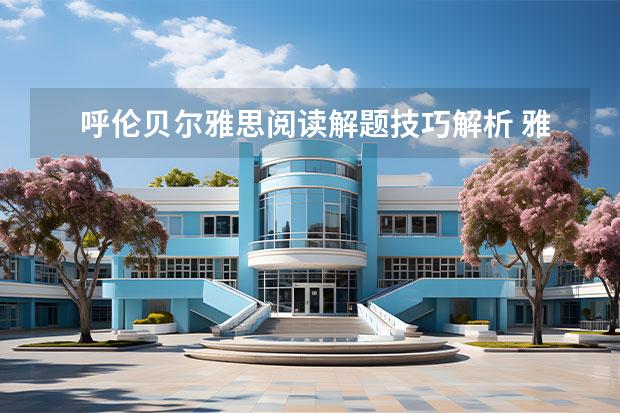 呼伦贝尔雅思阅读解题技巧解析 雅思剑10最后一篇文章的翻译 2023年剑桥雅思阅读真题解析:Thomas Young
呼伦贝尔雅思阅读解题技巧解析 雅思剑10最后一篇文章的翻译 2023年剑桥雅思阅读真题解析:Thomas Young
呼伦贝尔雅思阅读解题技巧解析在雅思考试中,雅思阅读题型也越来越多样化,为了考生能够高效的备考雅思阅读
2023年11月08日 00:25 2023雅思阅读真题全面解析及答案(2) 呼伦贝尔雅思阅读解题技巧解析 剑桥雅思9:阅读题型及要点剖析
2023雅思阅读真题全面解析及答案(2) 呼伦贝尔雅思阅读解题技巧解析 剑桥雅思9:阅读题型及要点剖析
2023雅思阅读真题全面解析及答案(2)您好,我是专注留学考试规划和留学咨询的小钟老师。在追寻留学梦
2023年11月16日 20:47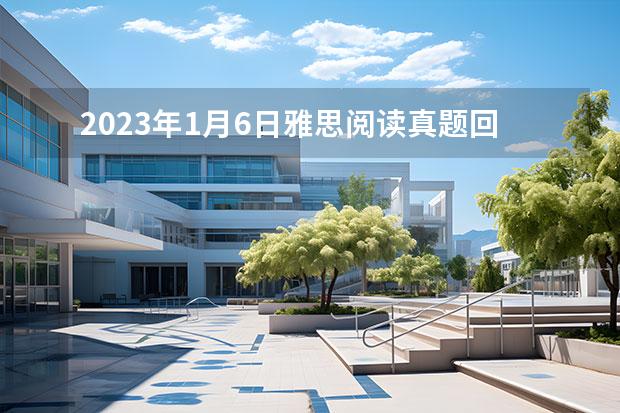 2023年1月6日雅思阅读真题回忆解析(呼伦贝尔雅思阅读解题技巧解析)
2023年1月6日雅思阅读真题回忆解析(呼伦贝尔雅思阅读解题技巧解析)
2023年1月6日雅思阅读真题回忆解析您好,我是专注留学考试规划和留学咨询的小钟老师。在追寻留学梦想
2023年11月18日 03:46 雅思阅读段落细节题特点解析 呼伦贝尔雅思阅读解题技巧解析 剑桥雅思5test1阅读第三篇的31题一直想不通
雅思阅读段落细节题特点解析 呼伦贝尔雅思阅读解题技巧解析 剑桥雅思5test1阅读第三篇的31题一直想不通
雅思阅读段落细节题特点解析段落细节配对题的题型特点1.题型位置纵观剑桥系列真题,尤其是近几年出版的剑
2023年11月21日 06:42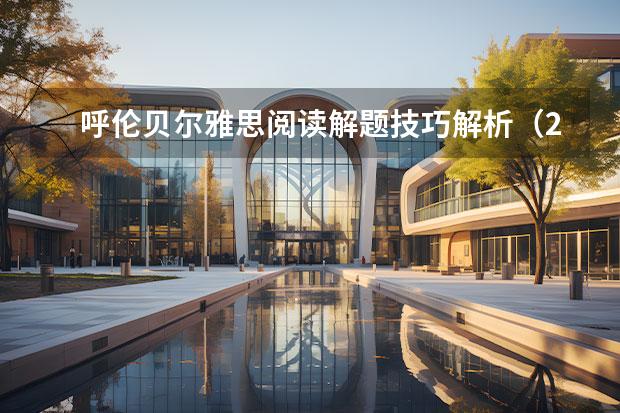 呼伦贝尔雅思阅读解题技巧解析(2023年4月雅思阅读考试真题答案(4月24日))
呼伦贝尔雅思阅读解题技巧解析(2023年4月雅思阅读考试真题答案(4月24日))
呼伦贝尔雅思阅读解题技巧解析在雅思考试中,雅思阅读题型也越来越多样化,为了考生能够高效的备考雅思阅读
2023年11月27日 21:34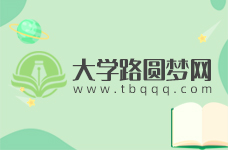
教育部:推动有条件的地方优化学前教育班额和生师比
时间:2024年11月12日
教育部:严格幼儿园教师资质条件,把好教师入口关
时间:2024年11月12日
教育部:教职工存在师德师风问题、侵害幼儿权益要依法严肃追究责任
时间:2024年11月12日
教育部:教师存在师德师风问题,损害幼儿身心健康的,要依法追究责任
时间:2024年11月12日
教育部:2023年全国普惠性幼儿园覆盖率达90.8%
时间:2024年11月12日
河北2024年3月出国留学雅思考试时间安排
时间:2024年02月18日
四川2024年3月出国留学雅思考试时间安排
时间:2024年02月18日
江苏2024年2月出国留学雅思考试时间安排
时间:2024年01月27日
雅思考试写作考试语法常见错误有哪些?
时间:2024年01月26日
雅思零基础该如何学习语法?
时间:2024年01月26日